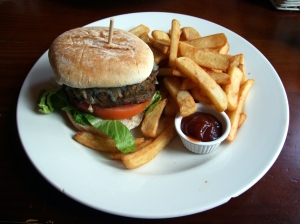
One of the advantages of family farms (compared to factory farms) is that the animals will likely get more space, and spend at least a portion of their lives outdoors. However animals still often experience some amounts of cruelty that may include greatly shortened lives, branding and castration.
I personally would not eat meat from any farm. Even a farm with very high welfare standards will still cause at least some smaller amount of suffering and I also oppose keeping animals in captivity or killing them for food in general. Others disagree and think that a farm that treats the animals better than the typical factory farm is OK.
Unfortunately, farms with higher welfare standards are quite rare, as factory farms account for about 99% of farm animals in the US1, over 80% in the UK2 and perhaps 70% worldwide3. Labels such as organic and free range also say very little if anything about animal’s welfare. It can still be highly cruel factory farming.
So if you really are committed to animals being treated well, you are committed to a vegetarian diet in fast food places, street food, and cheap restaurants. At such places, meat will almost always be from factory farms with high cruelty and it won’t be practical to check and find out.
And what if you are invited to dinner at someone’s house or to a wedding? A request to accommodate a vegetarian diet is relatively well understood and accepted these days. But, if you were to request that your meat came from only a family rather than factory farm, or only a farm with high welfare standards, how is the average host going to interpret that? It’s going to cause far more hassle and awkwardness than just saying you are a vegetarian.
Realistically, eating meat from family farms with good welfare standards means only eating at home (using meat from a farm you’ve actually visited) or occasionally in carefully selected and investigated restaurants. It would be easier to just go vegetarian.
Saying that factory farming should be ended, or that welfare standards should be improved, are empty words if you continue to send the factory farmers your money. In practice, most people who claim to support higher welfare standards in the agribusiness industry will then, often without really thinking about it, buy cheap meat in supermarkets, fast food outlets and so on, repeatedly paying to support and cause more intensive cruelty. They may perhaps occasionally buy a high end product from a better quality supermarket with a friendly sounding name of a farm that perhaps doesn’t even exist, and a cynically faked picture that has no relation to the real life of the animals. These are there to brainwash you into thinking you’re doing something good. You’re not.
The choice is clear. Either go (mostly) vegetarian/vegan or continue to pay for and support intense cruelty and suffering in our factory farms.
Sources:
1 – Eating Animals by Jonathan Safran Foer (Omnivore’s Dilemna by Michael Pollan also covers both factory and family farming in the US).
2 – According to Viva!, a UK-based animal rights organization as stated in the video http://www.viva.org.uk/what-we-do/cruel-britannia-life-and-death-uk-factory-farms. This may be a conservative estimate. This is the same video shared in my last blog.